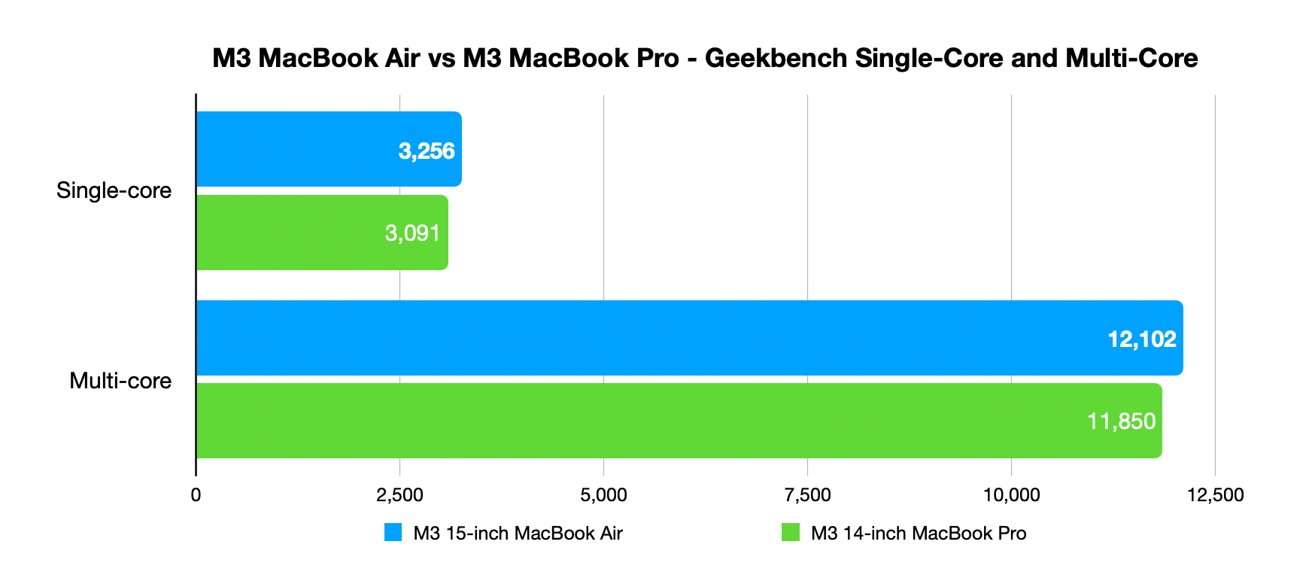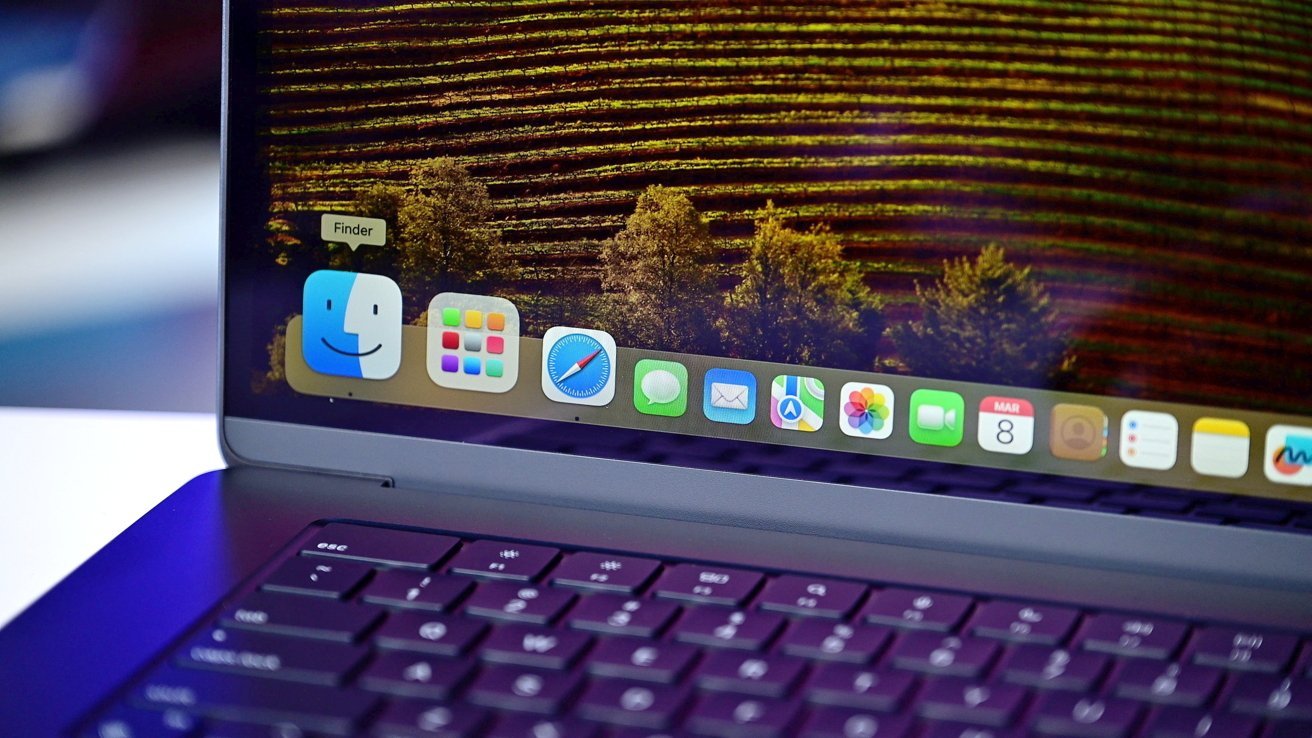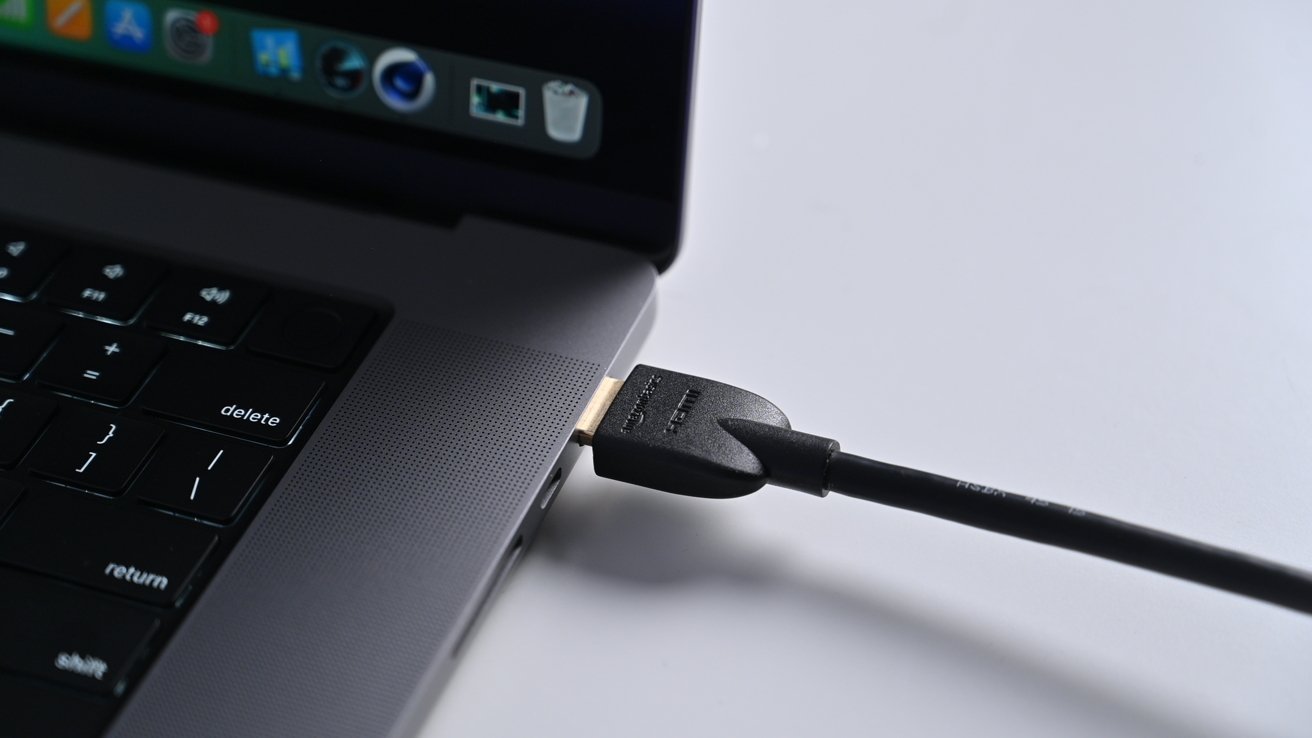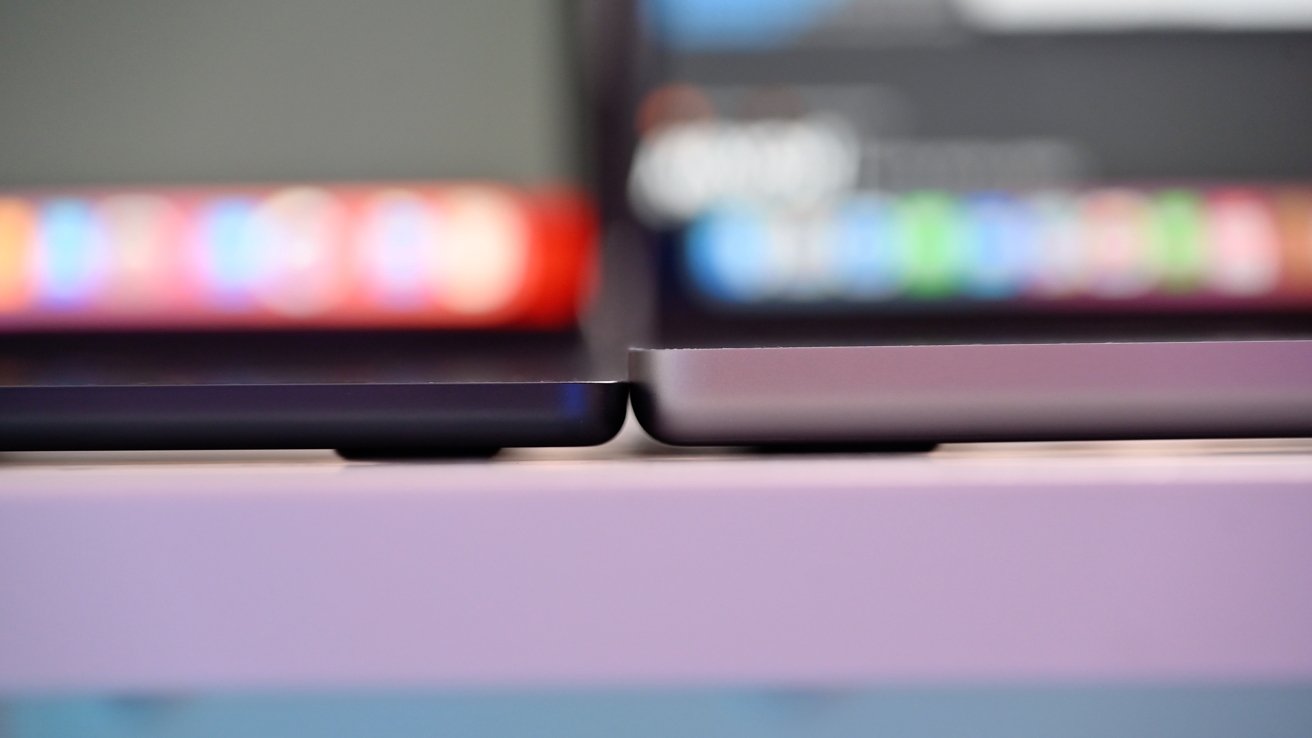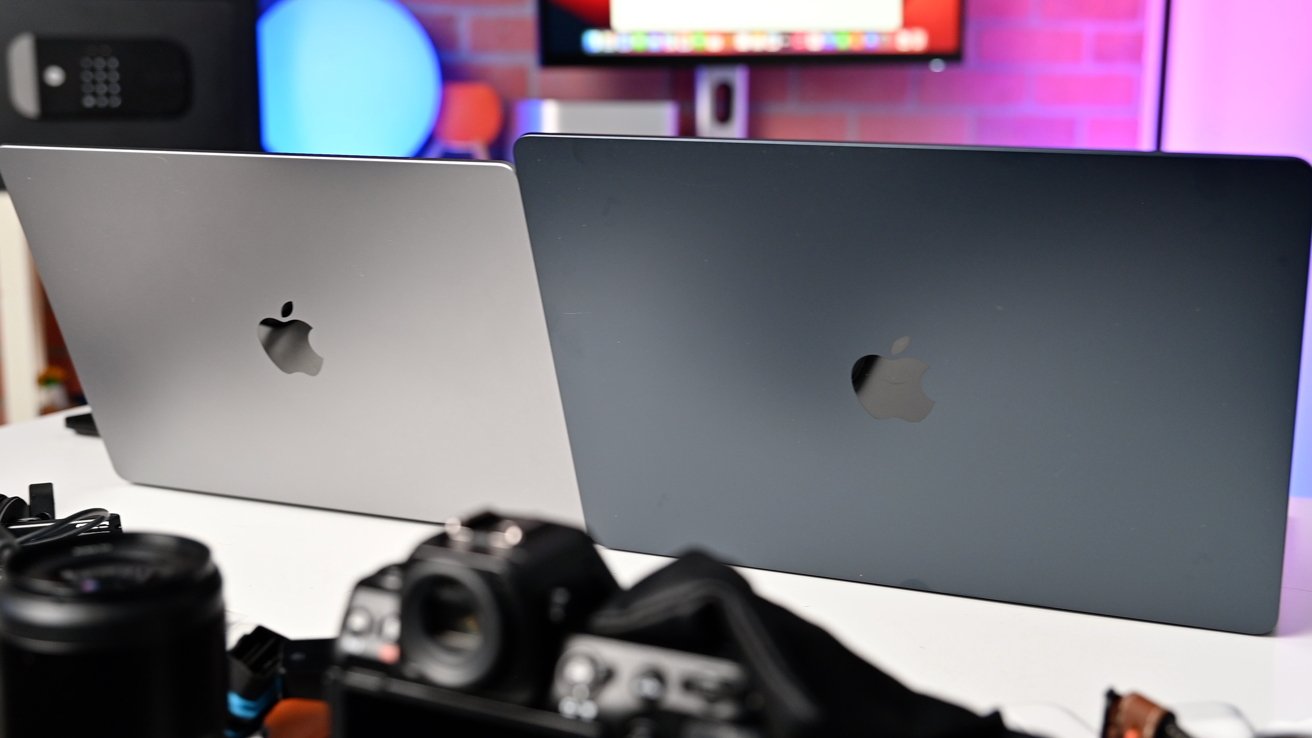Apple’s new 15-inch MacBook Air with M3 is very close, price-wise, to the 14-inch MacBook Pro. With similar core specifications, here’s what to consider when you have to choose between the two.
Apple’s revision of the MacBook Air with M3 now brings the lineup to the same level as the M3-equipped MacBook Pro models. Following the release, it’s possible to configure a MacBook Air and a MacBook Pro with the same base specifications.
Eagle-eyed observers may even spot that you can configure the 15-inch MacBook Air to have the same specifications as the base 14-inch MacBook Pro, and save $100 in the process.
This alone sounds like an enticing opportunity. MacBook Pro levels of power but in a cheaper and thinner form seems like a bargain. You may wonder if it’s worth buying a MacBook Pro if you can save money on something comparable with the MacBook Air.
The problem is that, while you can set up a MacBook Air to have the same core internals as a MacBook Pro, there are a lot more components and differences to bear in mind. Eventually, that $100 price difference seems less of a bargain after all.
For the purposes of comparison, we are pitting an unchanged baseline 14-inch MacBook Pro with M3 against a 15-inch MacBook Air configured to the same level as the Pro. It’s an upgraded MacBook Air for base-spec MacBook Pro money.
M3 15-inch MacBook Air vs 14-inch MacBook Pro – Comparison Specifications
| Specifications | M3 MacBook Air (15-inch, 2024) | M3 MacBook Pro (14-inch, 2023) |
|---|---|---|
| Launch Starting Price | $1,299 Best M3 MacBook Air 15-inch prices |
$1,599 Best M3 MacBook Pro 14-inch prices |
| Spec Price | $1,499 | $1,599 |
| Dimensions (inches) | 13.40 x 9.35 x 0.45 | 12.31 x 8.71 x 0.61 |
| Weight (pounds) | 3.3 | 3.4 |
| Display | 15.3-inch Liqud Retina Wide Color (P3), True Tone |
14.2-inch Liquid Retina XDR, Wide Color (P3) True Tone ProMotion |
| Resolution | 2,880 x 1,864 | 3,024 x 1,964 |
| Brightness | 500 nits | 1,000 nits sustained fullscreen, 1,600 nits peak HDR, 600 nits SDR |
| Processor | Apple M3 8-core | Apple M3 8-core |
| Graphics | 10-core GPU | 10-core GPU |
| Memory | 8GB | 8GB |
| Storage | 512GB | 512GB |
| Battery | 66.5Wh lithium-polymer | 70Wh lithium-polymer |
| Networking | 802.11ax Wi-Fi 6E Bluetooth 5.3 |
802.11ax Wi-Fi 6E Bluetooth 5.3 |
| Touch ID | Yes | Yes |
| Camera | 1080p FaceTime HD | 1080p FaceTime HD |
| Audio | Six-speaker sound system, Force-cancelling woofers, Three-mic array with directional beamforming, Voice Isolation and Wide Spectrum mic modes, Headphone jack with high-impedance headphone support, Dolby Atmos support with Spatial Audio |
Six-speaker sound system, Force-cancelling woofers, Three-mic array with directional beamforming and high signal-to-noise ratio, Headphone jack with high-impedance headphone support, Dolby Atmos support with Spatial Audio |
| Ports | Two Thunderbolt/USB 4 ports, 3.5mm headphone, MagSafe 3 |
Two Thunderbolt/USB 4 ports, SDXC Card Slot HDMI 3.5mm headphone, MagSafe 3 |
M3 15-inch MacBook Air vs 14-inch MacBook Pro – Storage and Memory
For this comparison, we are going to discuss the chief things that should be pretty identical first, namely storage, memory, and the chip running the show, before going into the other areas where there are differences.
Both the M3 MacBook Air and MacBook Pro start with 8GB of unified memory, with options for 16GB or 24GB. They work in the same manner and are priced identically as upgrades: 16GB for $200, 24GB for $400.
It’s a similar but slightly different story for storage. The Pro has 512GB as the starting value, with upgrades available to 1TB for $200 or 2TB for $600.
The MacBook Air also has a maximum capacity of 2TB, and the upgrade costs from 512GB are identical. The difference is that you can get the 256GB capacity model for $200 less.
For the purposes of this price-based comparison against the baseline, the 256GB to 512GB upgrade of the Air is required. But the bottom line here is that the 15-inch Air will be $100 less than the 14-inch Pro, regardless of the storage upgrade you choose.
M3 15-inch MacBook Air vs 14-inch MacBook Pro – Performance and Thermal Management
At face value, there should be no real difference between the M3 15-inch MacBook Air and the M3 14-inch MacBook Pro. The M3 chip inside the two is identical.
Using an 8-core CPU with four performance and four efficiency cores, a 10-core GPU with hardware-accelerated ray tracing, and a 16-core Neural Engine, they’re the same through and through.
There are no changes available in memory bandwidth either, at 100GB/s apiece, and the Media Engine’s the same, too.
When put under Geekbench 6 in reviews, the M3 in the 14-inch MacBook Pro managed 3,091 for the single-core test and 11,850 for the multi-core. The 15-inch MacBook Air hit 3,256 and 12,102 respectively.
It’s safe to say that the results are close enough to be pretty similar, with various small factors likely causing the small variance.
Even so, there is still a difference to consider: thermals.
The MacBook Air is designed to be a thin and light notebook, sacrificing elements to save space. That means it relies on a little bit of natural airflow and the thermal conductivity of the aluminum enclosure to reduce heat.
As a larger device, the MacBook Pro has a big benefit, in the form of a fan. Pushing air through the MacBook Pro helps keep the notebook cooler for longer under heavy loads.
What this means to users is that, if you’re using both notebooks for heavy sustained workloads, the MacBook Air will thermally throttle much quicker than the MacBook Pro due to the fan.
If you’re a user who does basic web surfing and light tasks, you’re not going to see this effect in action in everyday life. For creatives making YouTube videos and other intensive tasks, that cooling may be important.
Keep in mind, though, that the issue is not as dramatic as YouTube may present. For the target market at this price point, it’s mostly a non-issue.
M3 15-inch MacBook Air vs 14-inch MacBook Pro – Physical Dimensions
Both the 15-inch MacBook Air and 14-inch MacBook Pro look fundamentally similar. They both share the same Apple aesthetic of being a flat slab of aluminum and, when closed and carried around, they could easily be mistaken for the other.
Looking at the actual specifications of each, there’s the obvious size difference, in part due to the screens varying in dimension. At 13.40 by 9.35 inches, the 15-inch MacBook Air will naturally have a larger footprint than the 14-inch MacBook Pro at 12.31 by 8.71 inches.
In thickness, the MacBook Air maintains its position of being nice and thin at 0.45 inches against 0.61 for the Pro. The Air is physically larger but thinner overall than its Pro counterpart.
When it comes to weight, the results are actually quite similar. The MacBook Pro is at 3.4 pounds to the MacBook Air’s 3.3 pounds, which is pretty close considering the size differences.
M3 15-inch MacBook Air vs 14-inch MacBook Pro – Display
One of the main reasons to go for the MacBook Pro is the display quality, and for a few good reasons.
At 15.3 inches, the MacBook Air’s Liquid Retina screen is bigger than the 14.2-inch Liquid Retina XDR of the MacBook Pro. You get Wide Color (P3) coverage and True Tone in both, as well as the camera notch at the top of the screen.
Beyond that, things swing considerably in the Pro’s direction. MacBook Air’s Liquid Retina display uses LED backlighting, while the MacBook Pro’s Liquid Retina XDR version uses miniLED backlighting.
For users, that means the Air can manage up to 500 nits of brightness, while the MacBook Pro can do up to 1,000 nits sustained, 1,600 nits peak for HDR content, or 600 nits for SDR content.
The Pro also has a higher resolution for its smaller size at 3,024 by 1,964 against the Air’s 2,880 by 1,826. That gives the Air a pixel density of 224 pixels per inch to the Pro’s 254ppi.
That’s not all, as the MacBook Pro’s screen also supports ProMotion, allowing it to dynamically adjust the refresh rate up to 120Hz, against 60Hz for the Air.
M3 15-inch MacBook Air vs 14-inch MacBook Pro – Camera and Audio
Fitted into the notch, both notebooks have a 1080p FaceTime HD camera. It’s supported by the image signal processor of the M3 chip, providing improvements to the footage and benefits such as computational photography.
The audio offering is also pretty similar, with each having a six-speaker sound system with force-cancelling woofers. There’s Dolby Atmos support with Spatial Audio, too.
They also have a 3.5mm headphone jack with high-impedance headphone support, which will satisfy audiophiles.
Oddly, audio input is a bit different. Both do have a three-mic array with directional beamforming, but the MacBook Pro’s mics have a high signal-to-noise ratio for clarity.
Meanwhile, Apple says the mic system in the MacBook Air includes Voice Isolation and Wide Spectrum mic modes, borrowing the feature from the iPhone 15 Pro line.
M3 15-inch MacBook Air vs 14-inch MacBook Pro – Connectivity
Another key difference is in how the notebooks connect to peripherals. There are two Thunderbolt/USB 4 ports on each, as well as the 3.5mm headphone jack and a MagSafe 3 connection.
The MacBook Pro stands out because it manages to fit in a few more useful items.
That includes a HDMI port for connecting an external monitor without using up one of the two Thunderbolt connections. Meanwhile, the SDXC card slot makes it easy for videographers to offload footage without needing to plug in or carry around a separate card reader.
This change may be enough for creatives to avoid needing extra ports using a dock, for example. For the MacBook Air, a dock seems a little more certain in the owner’s future.
Wireless connectivity is identical across the two notebooks, with Apple employing Bluetooth 5.3 and supporting Wi-Fi 6E.
M3 15-inch MacBook Air vs 14-inch MacBook Pro – Battery and Charging
The difference in size and thickness does mean there’s a difference in battery capacity, but not by much. The 15-inch Macbook Air houses a 66.5Wh lithium-polymer battery, whereas the 14-inch MacBook Pro has a 70Wh version.
Apple says that each notebook can manage up to 15 hours of wireless web access. For Apple TV app movie playback, Apple says the 14-inch MacBook Pro can last up to 22 hours, while the 15-inch MacBook Pro can go for up to 18 hours.
Getting power into the MacBook Pro and Air can be handled over USB-C or MagSafe 3, but the charger you get does vary.
The 15-inch MacBook Air includes the 35W Dual USB-C Compact Power Adapter by default, but there is an upgrade available to 70W at no charge. The 14-inch MacBook Pro includes the 70W charger as standard.
M3 15-inch MacBook Air vs 14-inch MacBook Pro – Other Features
Both notebooks use Apple’s Magic Keyboard, which has backlighting with an ambient light sensor. There are 78 or 79 keys depending on the region, including 12 full-heigh function keys and four arrow keys in an inverted T formation.
At the top right is the Touch ID sensor for authentication. Apple has still not yet added Face ID to its notebooks, despite incorporating a notch into the design.
Below the keyboard is a Force Touch trackpad with multi-touch gesture support.
The MacBook Pro is available in Silver and Space Gray colorways. The MacBook Air also has Starlight and Midnight color options.
M3 15-inch MacBook Air vs 14-inch MacBook Pro – Comparative pricing
M3 15-inch MacBook Air vs 14-inch MacBook Pro – Pro is the way to go
Paying for upgrades on Apple products is an expensive business, so the need to penny-pinch where possible seems like a good idea. As mentioned at the start of this article, a $100 saving certainly isn’t to be sniffed at.
Sure, you may be willing to sacrifice a few GPU cores and marginally lower performance to shave a few hundred off the price in some configurations. But that isn’t the case here.
With the same CPU, memory, and storage, that $100 saving represents so many smaller changes that arguably outweigh cutting the cost altogether.
The far better display of the 14-inch MacBook Air, the extra ports, and the reduced thermal throttling are big plusses for the MacBook Pro.
What the 15-inch MacBook Air has going for it beyond $100 in savings are a slightly bigger screen, a thinner design, and a tiny bit of weight loss.
Unless screen size matters, or having a Midnight or Starlight color scheme, it’s probably best to swallow the $100 cost difference and go for the Pro model in this price bracket.
M3 15-inch MacBook Air vs 14-inch MacBook Pro – Where to buy
AppleInsider readers can grab exclusive savings on Apple’s M3 MacBook Air and M3 MacBook Pro 14-inch, with the latest deals in our Mac Price Guide.
Exclusive Deals Through AppleInsider
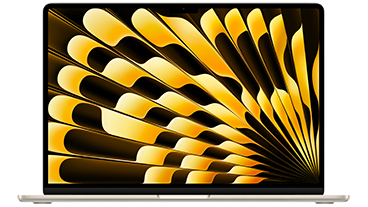

M3 MacBook Air 15-inch
Use coupon code APINSIDER to save $100 to $150 on every 15-inch M3 Air at Adorama.
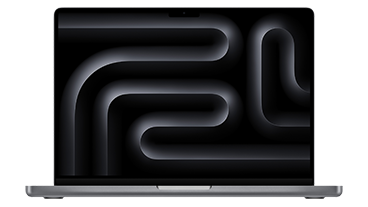

This story originally appeared on Appleinsider

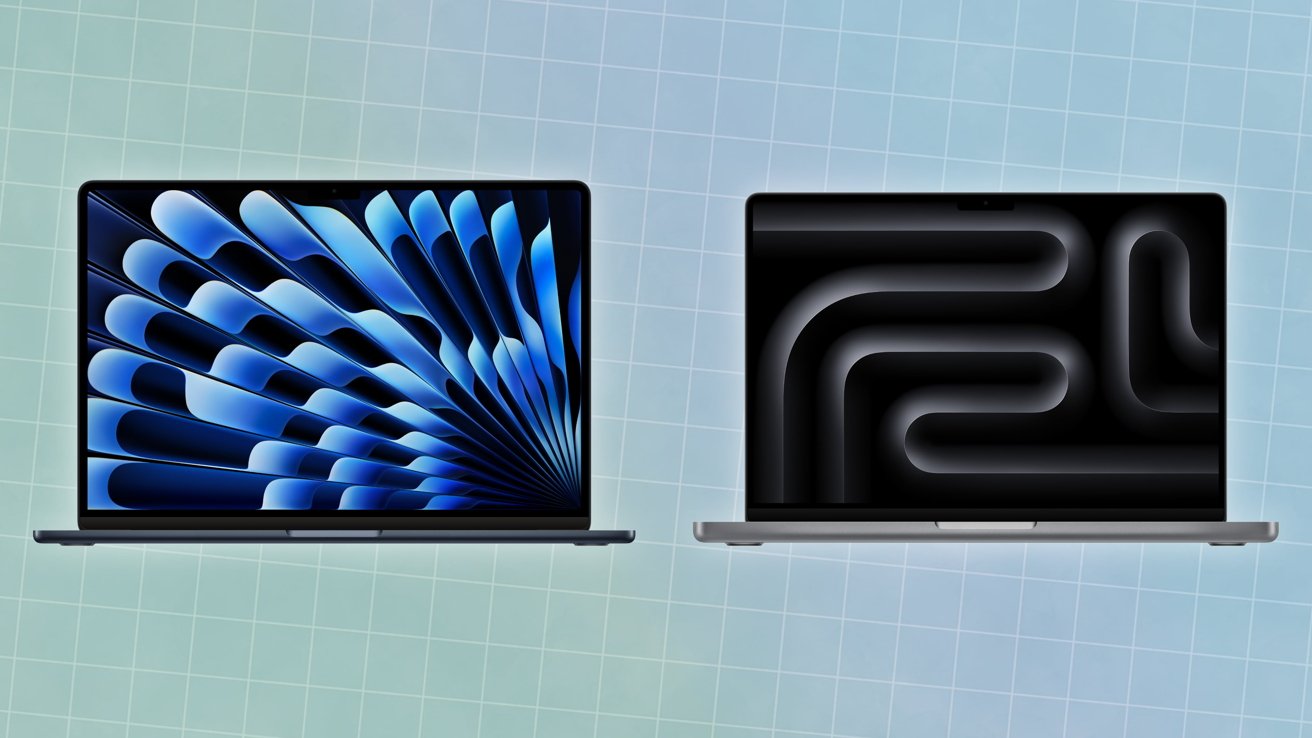
![M3 15-inch MacBook Air vs M3 14-inch MacBook Pro — MacBook Pro [left], MacBook Air [right]](https://photos5.appleinsider.com/gallery/58937-120243-macbookproandair-xl.jpg)
